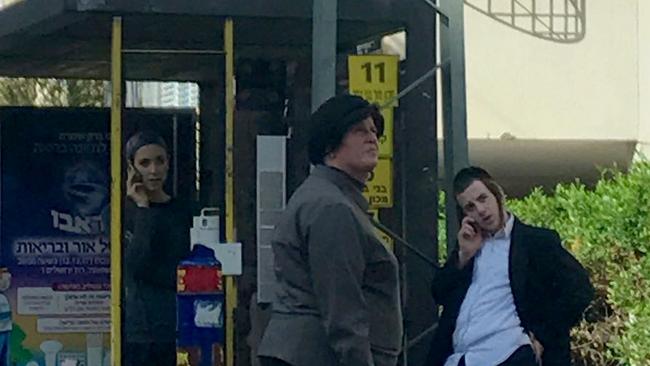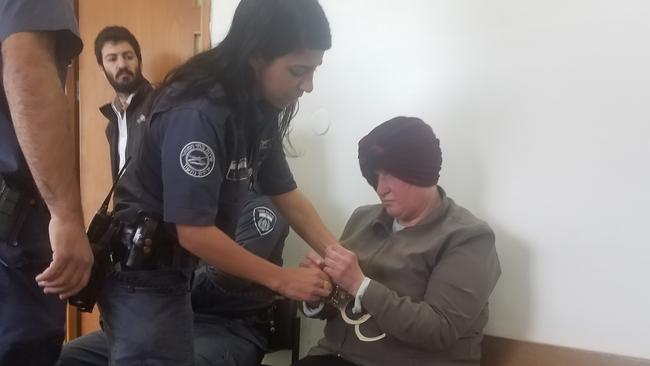Matter of principal: covert effort in fight for justice in Malka Leifer case
Malka Leifer’s grandmotherly demeanour belies the sex crimes she is accused of in Melbourne. Hubris got her in the end.

It is 10.48am on a chilly winter’s day in central Israel and accused sex offender Malka Leifer has no idea she is being watched as she waits at a bus stop, holding a bag of shopping, in the ultra-Orthodox enclave of Bnei Brak.
The former principal of the Adass Israel Jewish school in Melbourne does not see the private investigator who snaps her photo then, and again several hours later while she strolls in the street, talking into a phone on December 14.
These images of Leifer “living a fully functional and social life” when she was supposed to be bedridden with an acute mental illness were handed to Israeli police, adding weight to evidence secretly being assembled against the 54-year-old fugitive from Australian justice.
Her grandmotherly demeanour belies the crimes she is accused of in Melbourne, where she left in ruins the lives of more than a dozen of her former students, all girls, after making a midnight dash for the airport and finding refuge in Israel’s insular Haredi community nearly a decade ago.
Hubris turned out to be her downfall, leading to her arrest this week on charges of obstructing justice for allegedly faking the psychosis that was said to have rendered her unfit to attend court, thereby blocking her extradition to Australia.
A year ago, the case seemed dead in the water. A judge had accepted her lawyers’ arguments that she could not participate in the hearings and suspended the extradition application by Israeli state prosecutors, acting on behalf of the Australian government, to the horror of her alleged victims.
Leifer was freed from home detention and restrictions on her movements were lifted. To her, it must have seemed the problems that had chased her to Israel were over. So she got on with her life.

That was mistake No 1. In May last year, as the spring roses bloomed in the Upper Galilee, a smiling Leifer made an appearance at the Lag B’Omer religious festival. More than 200,000 Orthodox Jews flocked to the celebration on the slopes of Mount Meron in northern Israel. When photographs of Leifer enjoying herself were picked up by the media, questions were asked. Wasn’t she supposed to be agoraphobic? Hadn’t panic attacks incapacitated her?
At the Australian embassy in Tel Aviv, ambassador Dave Sharma was hearing that Leifer had returned to teaching and was tutoring children at her home.
Aghast, he contacted senior prosecutors in Israel’s Office of the State Attorney, which had carriage of the extradition request filed in 2014 for Leifer’s return to Melbourne to face 74 counts of child sexual assault, including rape. “We rightly thought it would be of concern to the Israeli authorities because here was a woman who was an alleged child sexual abuser being given custody of children again … we felt we were duty-bound to pass this on,” said Sharma, speaking publicly for the first time of the behind-the-scenes machinations.
He took his complaint up the line to Israel’s Minister for Justice, Ayelet Shaked. His message was that not only was the case hurting the country’s reputation, it also threatened to discredit its vaunted judicial system. “Of course we made this known privately, and diplomatically,” Sharma said.
“And we … asked the question, surely there must be a way to proceed on an alternative track that tested some of the assertions that her defence counsel was making? Particularly once those photos emerged of her in public, out and about, seemingly behaving quite normally and enjoying herself.”
The Israeli prosecutors told Sharma they understood Australia’s frustrations with the case: in fact, they shared them. Leifer’s outspoken lawyer, Yehuda Fried, had been openly dismissive of the extradition proceedings — and the wanted woman evidently made her biggest blunder of all by believing she was in the clear.
“Her defence team … was almost taunting of the judicial authorities and others that she would never in fact face justice in Australia and that they had managed to kick this into touch,” Sharma said.
Covertly, Israeli police had started to keep tabs on Leifer, whose mounting legal bills were being paid by her Haredi protectors. In Israel, the deeply Orthodox community is in some respects a law unto itself. Dressed head to toe in black, the men generally don’t work and are exempt from the military service that is compulsory for other Israelis: many Haredi live in close-knit segregation from the secular state.
However, a splintered political system gives them clout in the right-wing coalition government headed by Benjamin Netanyahu. For years, Leifer and her husband, Jacob, a conservative rabbi, had moved from one safe house to another in Haredi neighbourhoods.
After thickly populated Bnei Brak, east of Tel Aviv, they pitched up in the West Bank settlement of Immanuel, two hours’ drive north of Jerusalem, where she was taken into custody on Monday.
The surveillance operation Israeli police mounted is described as “sophisticated” but for now the details of what was recorded is being withheld, pending court hearings. Jerusalem police spokesman Micky Rosenfeld told The Weekend Australian Leifer had been charged with obstructing justice on “new information that was received that she can stand … trial, which she previously claimed a number of times she was unfit (to do).”
The police, however, were not the only ones monitoring Leifer. On October 26 last year, three of her alleged victims from Melbourne, Dassi Erlich and her sisters Elle and Nicole, had been asked to a restaurant in Jerusalem’s bustling Mahane Yehuda Market to meet Shana Aaronson, head of the Israeli office of the New York-based Jewish Community Watch organisation dedicated to tackling child sex abuse in the Orthodox community.
The Australians were in Israel to talk to politicians about the stalled extradition. Four days later, Malcolm Turnbull would arrive for a state visit during which he had promised to raise the Leifer case with Netanyahu.
Aaronson, who moved from the US to Israel as a teenager and worked with victims of child sex abuse, sat down with the sisters at a pizza restaurant called Hasandak and was profoundly moved by how they had been separately preyed upon at the Adass Israel School in the mid-2000s.
Leifer had been recruited from Israel by the school board, and was “like a god” in the Adass community, her former students say. While security staff watched over the children entering the school in leafy Elsternwick, she would take girls into her office and subject them to unspeakable acts of abuse, making a mockery of the fees their parents paid for a religious education, according to evidence presented to civil court proceedings launched by Dassi Erlich.
In 2016, the school reported annual income of $8.75 million.
When the balloon went up in 2008, the then leaders of the Adass community conspired to fly Leifer out of Melbourne in the dead of night, before police could investigate the allegations.
Erlich, now 30, said the alleged victims’ hopes had been raised three years ago with her initial arrest in Israel, then dashed as the extradition proceedings dragged on and on, finally to be put on ice. This was despite the record $1.27m in civil damages she was awarded on winning a civil damages case against the school in 2015.
Aaronson immediately contacted the founder of JCW, Meyer Seewald, in New York.
“We were inspired to hear and see first-hand the unbelievable efforts and fight that these women have been battling for years,” Seewald said this week. “Their determination motivated us to immediately discuss what practical actions we could take, to help push the wheels of justice forward, and we decided to work with private investigators in an effort to prove what we have all been certain of, that Leifer’s claims regarding her mental state are a farce.”
The photographs and video footage they captured buttressed the police surveillance, showing that Leifer was living “a fully functional and social life” at odds with her claimed incapacity. By then, the police had been authorised to tap her phone. “We did everything we were legally entitled to do,” a government source close to the investigation said.
A deal was done with JCW and other private investigators who were tailing Leifer on behalf of the victims to collate the evidence in a single file, which was sent to a psychiatric board three weeks ago. “While at some stages she was really stuck at home and acted accordingly, I think she began to feel too secure ... going out of the house, conducting business, speaking on the phone and shopping and going places. Our police managed to capture much of that activity, enabling us to get a very primary opinion of a psychiatrist ... suggesting that she is fit and her sickness is pretty much an act.”
The political heat was also being ramped up from Australia. Then attorney-general George Brandis raised the case directly with Netanyahu and senior figures in government, paving the way for Turnbull to take up the cudgels during October’s visit to Israel to mark the centenary of the Light Horse’s epic World War I charge at Beersheba.
Victorian Premier Daniel Andrews weighed in on December 7 when he saw the Israeli Prime Minister in Jerusalem for a meeting that lasted three times longer than the scheduled 30 minutes. Promising to take a “fresh look” at the case, Netanyahu made a point of saying this would be “without bias”.
Sharma, who has kept track of proceedings since completing his posting as ambassador last June, was “immensely pleased” with this week’s breakthrough. “It was a significant issue for the bilateral relationship,” he said. “It was obviously a deep issue for Australia, the Australian public, the victims and indeed the Jewish community in Melbourne.
“I thought it was immensely important this issue be addressed, and addressed properly.”
Stout and red-eyed, Leifer cut a forlorn figure when she appeared in court on Wednesday, chided by prison guards for rattling her steel handcuffs and shackles. Her lawyer, Fried, said she was the one being victimised. “The prosecution don’t like to lose and they are very frustrated,” he told Ram Winograd, the new judge on the case. “What do they do? They catch her at the laundromat. And it looks to the Australians like they are doing something.”
Winograd ordered that she be held in hospital under prison conditions and be observed by the Jerusalem district psychiatrist, who will recommend next week whether she is fit for court. Dassi Erlich felt only relief at the sight of Leifer finally in the dock.
“There have been hours of anxiety, particularly while waiting to hear minute-to-minute live updates during her hearings in Israel,” she said. “Seeing her picture has been confronting ... but at the time feeling completely surreal that this is actually happening and she is handcuffed in court for the first time ever.”
Additional reporting: Jacob Atkins


